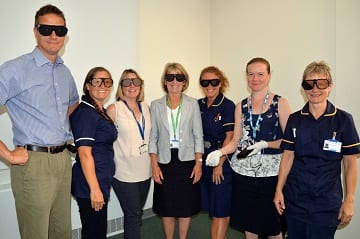A new piece of technology is helping staff who treat elderly people at Musgrove Park Hospital better understand their needs by experiencing their patients’ different conditions for themselves.
The Age Simulation suit is made up of different parts for the head, face, arms, torso and legs and mimics the conditions that many elderly people suffer from.
It includes goggles which imitate different types of sight loss, a glove which mimics Parkinson’s through shaking, and knee wraps which give a realistic impression of having restricted joint mobility.
Clinical staff have been using the suit in training sessions to help them better understand patients’ conditions and appreciate some of the difficulties they face in day to day life.
Chris Wilkin, a mental health practitioner for older people, has been helping train staff with the suit.
He said: “It’s hard to experience being old until you actually are old. “When you’re frail and get tired moving about, you don’t want to get up or move around too often. You end up not doing things that you enjoy or would like to because of the effort involved. “There are lots of different parts to the suit and we’ve been getting staff to try the various parts on to help their understanding of how difficult what they’re asking patients to do can sometimes be.
“The suit helps you appreciate just how hard some of the little things that we take for granted can be for elderly people such as trying to take a pill out of a pillbox. “It is easy to understand something on an academic level but experiencing it first hand is quite different.
“That’s what simulation aims to do, give people the experience of some of the issues elderly people face on a day to day basis.”
The suit was bought by the League of Friends for the hospital, and cost £2,805.
Peter Renshaw, chair of the League, said: “The League of Friends was pleased to be able to fund the Age Simulation Suit under its Small Grants Scheme. “This piece of equipment will help staff understand some of the effects of old age and as such staff will be better prepared to help patients when they are in hospital.”


 Please Wait...
Please Wait...